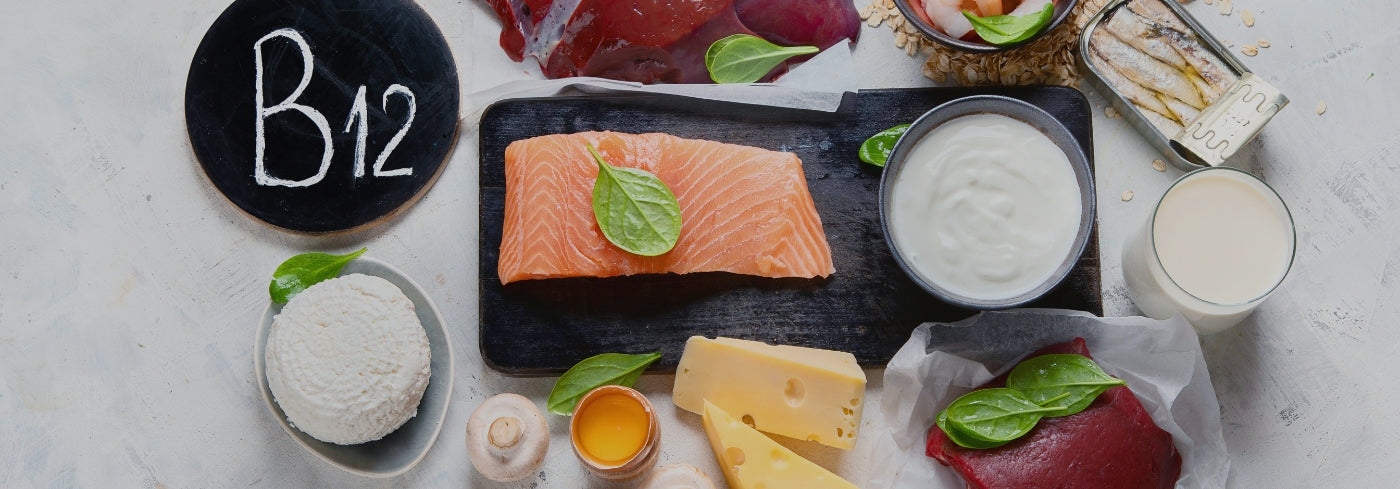Vitamine B12 is een van de belangrijkste vitamines voor ons lichaam. Het speelt een cruciale rol in de aanmaak van rode bloedcellen, de werking van het zenuwstelsel en het vrijmaken van energie uit voedsel. Tot nu toe moesten we deze essentiële vitamine vooral uit dierlijke producten halen, zoals vlees, vis, zuivel en eieren. Maar een recente doorbraak in wetenschappelijk onderzoek kan hier verandering in brengen.
Wat betekent dit voor vegetariërs, veganisten en iedereen die minder dierlijke producten wil consumeren? En waarom is B12 eigenlijk zo belangrijk? In deze blog duiken we dieper in de wereld van B12, de risico’s van een tekort en de nieuwe mogelijkheden om deze vitamine plantaardig binnen te krijgen.
Waarom is vitamine B12 zo belangrijk?
Vitamine B12, ook bekend als cobalamine, heeft meerdere essentiële functies in het lichaam. Het draagt bij aan:
· De aanmaak van rode bloedcellen, die zuurstof door ons lichaam transporteren. Een tekort kan leiden tot bloedarmoede, wat vermoeidheid en zwakte veroorzaakt.
· Een gezond zenuwstelsel, omdat B12 helpt bij de bescherming en groei van zenuwcellen. Langdurig tekort kan neurologische schade veroorzaken.
· Een goed functionerend DNA en energiemetabolisme, waardoor het lichaam efficiënt voedingsstoffen omzet in energie.
· Een goed geheugen en cognitieve functies, wat kan helpen om mentale achteruitgang op latere leeftijd te voorkomen.
Omdat ons lichaam geen B12 zelf aanmaakt, moeten we het volledig uit voeding of supplementen halen.
Wat zijn de gevaren van een B12-tekort?
Een tekort aan vitamine B12 kan ernstige gezondheidsproblemen veroorzaken. De symptomen ontwikkelen zich vaak langzaam en worden niet altijd direct herkend. Veelvoorkomende klachten bij een tekort zijn:
- Extreme vermoeidheid en zwakte
- Duizeligheid en kortademigheid door bloedarmoede
- Tintelingen in handen en voeten door beschadiging van zenuwen
- Geheugenproblemen en concentratieproblemen
- Spierzwakte en coördinatieproblemen
Langdurig onbehandelde tekorten kunnen leiden tot onherstelbare zenuwbeschadiging. Vooral veganisten, vegetariërs, ouderen en mensen met darmproblemen lopen een verhoogd risico op een tekort, omdat ze minder of geen B12 via voeding binnenkrijgen.
Nieuwe doorbraak: een plantaardige bron van vitamine B12
Tot nu toe werd aangenomen dat vitamine B12 alleen in dierlijke producten voorkomt, omdat het wordt geproduceerd door bacteriën in het maag-darmkanaal van dieren. Maar een recente wetenschappelijke ontdekking heeft aangetoond dat er een plantaardige bron van B12 mogelijk is.
Wetenschappers hebben spirulina, een blauwgroene alg, genetisch gemodificeerd om biologisch actieve B12 te produceren. Dit is een enorme doorbraak, omdat spirulina al een populair superfood is, rijk aan eiwitten, antioxidanten en mineralen. De nieuwe variant van spirulina bevat nu ook voldoende B12 om een volwaardig alternatief te zijn voor dierlijke bronnen.
Wat zegt het onderzoek?
Uit het onderzoek blijkt dat de gemodificeerde spirulina per 100 gram ongeveer 1,64 microgram B12 bevat. Ter vergelijking: rundvlees bevat tussen de 0,7 en 1,5 microgram B12 per 100 gram. Dit betekent dat spirulina binnenkort een serieuze vervanger kan worden voor dierlijke B12-bronnen.
De impact van deze ontdekking is enorm, vooral voor mensen die een plantaardig dieet volgen en afhankelijk zijn van supplementen.
Heb je nog steeds B12-supplementen nodig?
Hoewel deze ontdekking veelbelovend is, zijn deze B12-rijke spirulinaproducten nog niet op grote schaal beschikbaar. Totdat dit wél het geval is, blijven B12-supplementen de meest betrouwbare manier om voldoende van deze vitamine binnen te krijgen – vooral voor veganisten, vegetariërs en mensen met een verhoogd risico op een tekort.
Zorg dat je een supplement van hoge kwaliteit kiest, want niet alle B12-supplementen zijn gelijk. Sommige bevatten een synthetische vorm van B12 (cyanocobalamine), terwijl andere natuurlijkere vormen zoals methylcobalamine en adenosylcobalamine bevatten. Deze laatste twee zijn beter opneembaar en direct bruikbaar voor het lichaam.
Ons B12-supplement is speciaal ontwikkeld om jouw dagelijkse B12-inname op een effectieve en goed opneembare manier aan te vullen. Bekijk het hier: Vitamine B12 supplement.








